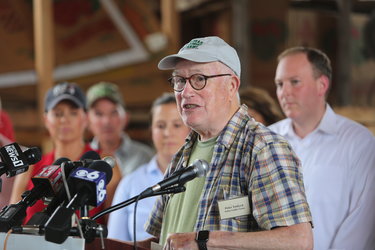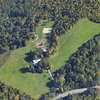Peter Ten Eyck, innovative farmer, mourned
NEW SCOTLAND — In 2015, as Peter Ten Eyck waited for Carl Heastie to arrive at Indian Ladder Farms for a tour, he had a clear idea of what he’d like the State Assembly speaker to see.
“I want him to see modern food being grown by the latest technology. I want him to know we’re going to win; we’re going to beat the factory farms,” Ten Eyck told The Enterprise at the time.
Mr. Ten Eyck, who died on Thursday, Sept. 25, 2025, was a constant innovator.
Peter was one in a long line of Ten Eyck stewards of Indian Ladder Farms, which runs along the base of the Helderberg escarpment on both sides of the Altamont-Voorheesville Road for nearly a mile, and has become a mecca for the Capital Region, where city dwellers and suburbanites alike can connect with the country.
One of his earliest and signature innovations was the introduction of cider doughnuts to the farm’s retail market in the early 1970s, a move which met resistance from his father.
“My father simply could not accept the idea that a fruit farm would make doughnuts and that the cost of a machine to do it was $2,500,” Mr. Ten Eyck wrote in a history of his family’s farm, but he prevailed. “The cider doughnuts, and later the bakery and café proved so successful that in the 1990s a new space was constructed for the cider press and its former space was converted into a kitchen to accommodate production.”
Tim Albright, who worked at Indian Ladder Farms for four decades, said Mr. Ten Eyck was always “on the cusp of trying new things. He was always at the forefront.”
Mr. Albright said, “We had many varieties that he planted on the farm that were experimental varieties that hadn’t even been named yet. They were only recognized by a numeral before a name was applied to those varieties.”
The significance of the varieties, Mr. Albright explained, is “when you’re getting ready to plant an orchard, you have to order apples, especially the newer varieties. You have to order them two or three years in advance from the nursery.”
Mr. Albright said, “You have to be really out in front of it: To think what is going to be the market apples for the future, 10 years down the road. Because if you order in trees and that variety falls by the wayside, you’re in trouble. You’ve invested a lot of money in something that is not going to work. The public is always grasping for the new thing, the newest thing.”
One new variety of apple cited by Mr. Albright is the Snapdragon, but one varietal bet Mr. Ten Eyck made before Mr. Albright’s time at Indian Ladder has proven to be a decadeslong winner: the Empire Apple.
Mr. Ten Eyck was one of the first growers to invest in the Empire Apple, which “was a big hit,” Albright said, “and it still is. People love the Empire. It’s a beautiful apple, and it’s a universal apple for all types of needs with regard to what people use apples for. It is a fantastic all-around apple.”
Mr. Albright also reflected on Peter Ten Eyck, the person.
“Pete as an employer was a good employer, a good man … He was responsible for employing thousands, if not tens of thousands, of local people in the community over the many decades that he was in charge of Indian Ladder Farms.”
Mr. Albright said, “So many young people … worked there seasonally. It was quite impressive, the amount of people you meet [who’d] say, ‘Yeah, I put in some time at Indian Ladder Farms; I worked at Indian Ladder Farms.’ He was a good employer, and he was a good person, giving his time to community service, serving on the school board, and doing many other things.”
In 2000, Indian Ladder, “always at the forefront of sustainable agriculture, partnered with Red Tomato of Boston and the Integrated Pest Management Institute of America to become one of 18 “ECO Apple” growers in New England and New York,” Mr. Ten Eyck wrote in his family farm history, “operating at the highest standards of fruit production, maintained by third-party on-farm inspections.”
The group “is a pretty special group of growers,” Ten Eyck told The Enterprise a few years later. ECO Apple tries “to push the envelope” by educating itself and being “thoughtful” about the products used on their crops, he said.
ECO Apple used integrated pest management where pesticides and fungicides were not used unless there was evidence they were needed, Mr. Ten Eyck said in 2007. The motto of ECO Apple is, “Don’t use them if you don’t have to,” he said. “We’re trying to say that we’re responsible about working these things out, and we’re knowledgeable.”
Mr. Ten Eyck said, “Our agenda is to grow apples that don’t have pesticide residue on them.”
In 2001, working with the Mohawk Hudson Land Conservancy, known as the Albany County Land Conservancy at the time, Indian Ladder Farms sold its development rights for close to $840,000 to remain farmland forever. The agreement protected 317 acres of Mr. Ten Eyck’s farmland from development. Even if the property is sold, it may not be developed.
In the decades since conservation, the farm has expanded beyond apples to include a store with local produce and crafts, a restaurant, a bake shop, a cidery, a petting zoo, an event space, and a cannabis-growing operation.
In 2008, The Enterprise reported on Mr. Ten Eyck’s use of farming equipment so new that, in fact, a visitor might not notice anything out of the ordinary, or think that they were anything more than greenhouses. High tunnels look like greenhouses, but are open at either end, allowing ventilation. The tunnels create a warm, dry environment for plants.
The tunnels were each 25 feet by 300 feet, with three tied together for stability. The first bay had fall, or day-neutral, strawberries planted in the ground. After the first spring crop, these plants produced a second fall crop right through October, Mr. Ten Eyck said. “Fresh strawberries in October is pretty cool,” he said.
“It’s fairly new stuff,” Tom Gallagher of the Cornell Cooperative Extension Center in Voorheesville said at the time. “It’s been around for four or five years.”
Mr. Ten Eyck at the time was starting his third year with the tunnels. He described them as season-extenders: By capturing heat under plastic pulled across plastic tubes, or hoops, one can grow plants faster and earlier in the spring, or longer into the fall.
“So I could really be more of a southern grower,” he said. “We put up our experimental project.”
In 2016, Mr. Ten Eyck was awarded the Distinguished Service Citation by the New York State Agricultural Society Forum; it’s the highest honor bestowed by the society.
“We grow our own food in the fabric of the community. That’s what this is all about,” Mr. Ten Eyck said at the time.
Mr. Ten Eyck, who served for a dozen years as a Cornell trustee, said, “We’re trying to keep agriculture viable. We have to empower small to medium farms to be productive. Americans have to stop waving money in the air and hope someplace else in the world will meet their needs … We have to have not just sustainable farming but sustainable cuisine. People who eat have to take responsibility for how things are grown.”
To succeed as a small farmer, Mr. Ten Eyck told The Enterprise at the time, “You’ve got to be a destination place. You’ve got to be in the entertainment business.” He explained, “People eat four or five times a day for a recreational experience; it’s not to sustain themselves.”
Mr. Ten Eyck’s words were echoed the year prior as Speaker Heastie told reporters he’d bring his “daughter up here in the spring.”



